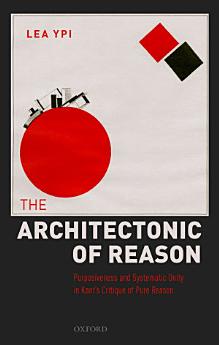The Architectonic of Reason: Purposiveness and Systematic Unity in Kant's Critique of Pure Reason
Nov 2021 · Oxford University Press
Ebook
232
Pages
family_home
Eligible
info
reportRatings and reviews aren’t verified Learn More
About this ebook
The Architectonic of Pure Reason, one of the most important sections of Kant's first Critique, raises three fundamental questions. What can I know? What should I do? What may I hope? Taken together these questions converge on a fourth one, which is at the centre of philosophy as a whole: what is the human being? Lea Ypi suggests that the answer to this question is tied to a particular account of the unity of reason - one that stresses its purposive character. By focusing on the sources, evolution and function of Kant's concept of purposiveness, this book shows that the idea of purposiveness that Kant endorses in the Critique of Pure Reason is a concept of purposiveness as intelligent design, quite different from the concept of purposiveness as normativity that will become central to his later works. In the case of purposiveness as design, the relationship between reason and nature is anchored to the idea of God. In the case of purposiveness as normativity, it is anchored to the concept of reflexive judgment, and grounded on transcendental freedom. Understanding this shift has important implications for some of the most difficult questions that confront the Kantian system: the passage from the system of nature to that of freedom, the relation between faith and knowledge, the philosophical defence of progress in history, and the role of religion. It is also crucial to shed light on the way in which Kant's critique has shaped the successive German philosophical tradition.
About the author
Lea Ypi is Professor in Political Theory at the London School of Economics, and Political Science and Adjunct Professor in Philosophy at the Australian National University. A native of Albania, she has degrees in Philosophy and in Literature from the University of Rome La Sapienza, a PhD from the European University Institute, and was a Post-Doctoral Prize Research Fellow at Nuffield College, Oxford University. Her work has been recognised with several prizes such as the British Academy Prize for Excellence in Political Science and the Leverhulme Prize for Outstanding Research Achievement. She contributes to The Guardian and The New Statesman. Her work has been translated in a dozen languages and published worldwide.
Rate this ebook
Tell us what you think.
Reading information
Smartphones and tablets
Install the Google Play Books app for Android and iPad/iPhone. It syncs automatically with your account and allows you to read online or offline wherever you are.
Laptops and computers
You can listen to audiobooks purchased on Google Play using your computer's web browser.
eReaders and other devices
To read on e-ink devices like Kobo eReaders, you'll need to download a file and transfer it to your device. Follow the detailed Help Center instructions to transfer the files to supported eReaders.





